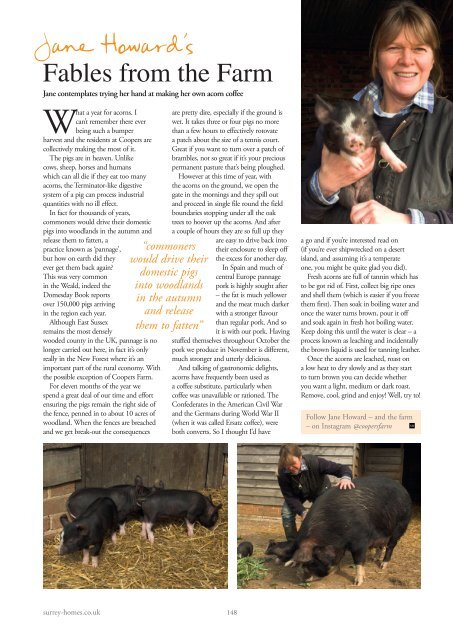Surrey Homes | SH37 | November 2017 | Gift supplement inside
The lifestyle magazine for Surrey - Inspirational Interiors, Fabulous Fashion, Delicious Dishes
The lifestyle magazine for Surrey - Inspirational Interiors, Fabulous Fashion, Delicious Dishes
You also want an ePaper? Increase the reach of your titles
YUMPU automatically turns print PDFs into web optimized ePapers that Google loves.
Jane Howard’s<br />
Fables from the Farm<br />
Jane contemplates trying her hand at making her own acorn coffee<br />
What a year for acorns. I<br />
can’t remember there ever<br />
being such a bumper<br />
harvest and the residents at Coopers are<br />
collectively making the most of it.<br />
The pigs are in heaven. Unlike<br />
cows, sheep, horses and humans<br />
which can all die if they eat too many<br />
acorns, the Terminator-like digestive<br />
system of a pig can process industrial<br />
quantities with no ill effect.<br />
In fact for thousands of years,<br />
commoners would drive their domestic<br />
pigs into woodlands in the autumn and<br />
release them to fatten, a<br />
practice known as ‘pannage’,<br />
but how on earth did they<br />
ever get them back again?<br />
This was very common<br />
in the Weald, indeed the<br />
Domesday Book reports<br />
over 150,000 pigs arriving<br />
in the region each year.<br />
Although East Sussex<br />
remains the most densely<br />
wooded county in the UK, pannage is no<br />
longer carried out here, in fact it’s only<br />
really in the New Forest where it’s an<br />
important part of the rural economy. With<br />
the possible exception of Coopers Farm.<br />
For eleven months of the year we<br />
spend a great deal of our time and effort<br />
ensuring the pigs remain the right side of<br />
the fence, penned in to about 10 acres of<br />
woodland. When the fences are breached<br />
and we get break-out the consequences<br />
“commoners<br />
would drive their<br />
domestic pigs<br />
into woodlands<br />
in the autumn<br />
and release<br />
them to fatten”<br />
are pretty dire, especially if the ground is<br />
wet. It takes three or four pigs no more<br />
than a few hours to effectively rotovate<br />
a patch about the size of a tennis court.<br />
Great if you want to turn over a patch of<br />
brambles, not so great if it’s your precious<br />
permanent pasture that’s being ploughed.<br />
However at this time of year, with<br />
the acorns on the ground, we open the<br />
gate in the mornings and they spill out<br />
and proceed in single file round the field<br />
boundaries stopping under all the oak<br />
trees to hoover up the acorns. And after<br />
a couple of hours they are so full up they<br />
are easy to drive back into<br />
their enclosure to sleep off<br />
the excess for another day.<br />
In Spain and much of<br />
central Europe pannage<br />
pork is highly sought after<br />
– the fat is much yellower<br />
and the meat much darker<br />
with a stronger flavour<br />
than regular pork. And so<br />
it is with our pork. Having<br />
stuffed themselves throughout October the<br />
pork we produce in <strong>November</strong> is different,<br />
much stronger and utterly delicious.<br />
And talking of gastronomic delights,<br />
acorns have frequently been used as<br />
a coffee substitute, particularly when<br />
coffee was unavailable or rationed. The<br />
Confederates in the American Civil War<br />
and the Germans during World War II<br />
(when it was called Ersatz coffee), were<br />
both converts. So I thought I’d have<br />
a go and if you’re interested read on<br />
(if you’re ever shipwrecked on a desert<br />
island, and assuming it’s a temperate<br />
one, you might be quite glad you did).<br />
Fresh acorns are full of tannin which has<br />
to be got rid of. First, collect big ripe ones<br />
and shell them (which is easier if you freeze<br />
them first). Then soak in boiling water and<br />
once the water turns brown, pour it off<br />
and soak again in fresh hot boiling water.<br />
Keep doing this until the water is clear – a<br />
process known as leaching and incidentally<br />
the brown liquid is used for tanning leather.<br />
Once the acorns are leached, roast on<br />
a low heat to dry slowly and as they start<br />
to turn brown you can decide whether<br />
you want a light, medium or dark roast.<br />
Remove, cool, grind and enjoy! Well, try to!<br />
Follow Jane Howard – and the farm<br />
– on Instagram @coopersfarm<br />
surrey-homes.co.uk<br />
148


















